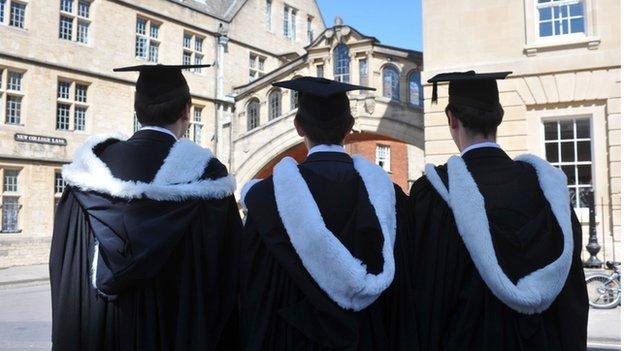Hitting the streets of Cardiff in search of missing voters
- Published
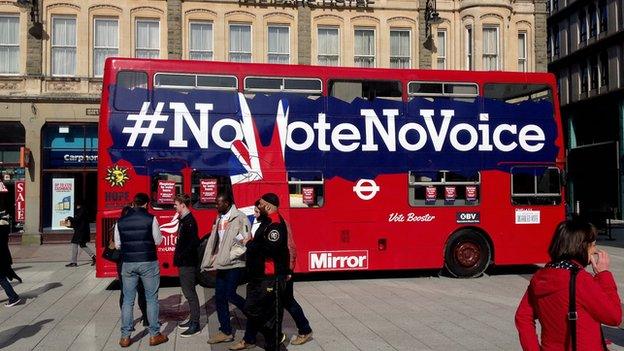
Campaigners fear a change in the voter registration system could leave millions unable to take part in May's general election. Brian Wheeler caught up with a UK-wide voter registration drive as it hit the streets of Cardiff.
It sounds like a thankless task - badgering bleary-eyed students to fill in forms, when they would rather be enjoying the spring sunshine or sleeping off their hangovers.
But the eager team of young volunteers knocking on doors in Cathays, Cardiff's student quarter, is undaunted.
The hardest part so far, as they criss-cross the terraced streets of bedsit land, has been finding someone who admits to not being on the electoral register.
They can barely contain their glee when they manage to sign up a new voter. It soon turns into a competition to see who can get the most signatures.
"As a democratic society, it's important that they exercise their right to vote, especially with elections coming up," says Ali Abdi, 28, of campaign group Cardiff Citizens.
Hope Not Hate and Bite the Ballot volunteers taking part in voter registration drive in Cardiff
What happens if they are simply not interested?
"We are going to give them sweets!"
The 70 or so volunteers, from local churches, mosques, youth groups and scout troops, are taking part in a nationwide effort to fix a problem that could rob thousands of people of a chance to have their say in 7 May's general election.
The introduction of individual voter registration last year was meant to crack down on electoral fraud.
Disenfranchised
Under the old system, one person in each household completed the registration for every resident eligible to vote.
Now everyone has to register individually by providing their national insurance number and date of birth.
About 7.5 million people had already gone missing from the electoral register before the new system was introduced, but campaigners fear a further million have been disenfranchised.
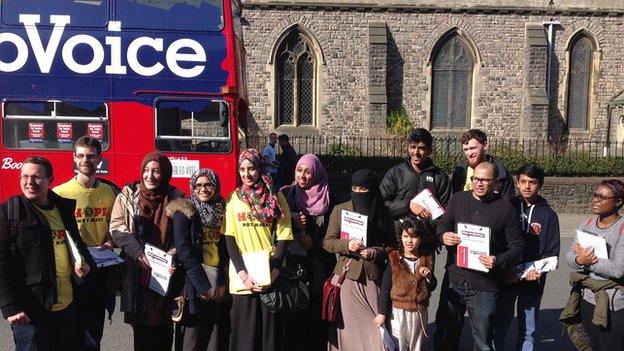
Volunteers from mosques and churches took part in the registration drive
Since 1 March, campaigners from Hope Not Hate, Bite the Ballot, Operation Black Vote, Operation Disabled Vote and trade union Unite have been travelling the country in a red double decker bus organising voter registration drives like this one, in workplaces, community centres and going door-to-door.
The government insists the general election will not be affected by the changes because anyone on the old register, from December 2013, will be entitled to vote on 7 May.
But anyone who has moved house in the interim will need to re-register - and there is a particular problem with students.
Previously, first-year students tended to be registered en masse by their college or university acting as "head of the household", which ensured almost 100% registration.
Now they have to register individually by providing their national insurance number. Many have not bothered to do this or are unaware that the system has changed.
As many as 5,500 students are thought to have disappeared from the electoral register in the Cathays area of Cardiff alone, with 23,000 fewer registered voters in the city as a whole.
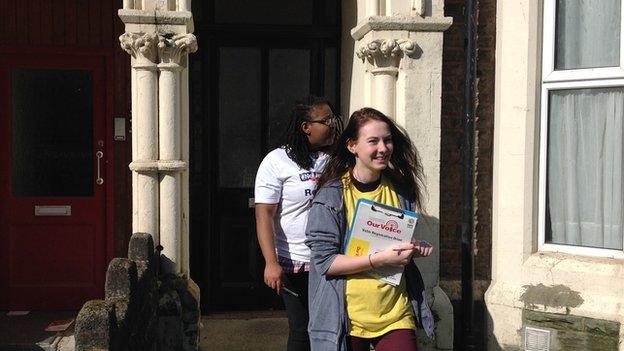
Volunteers pound the pavements in search of missing student voters
The government has spent £4.2m across the UK on trying to get under-represented group such as students and members of ethnic minorities on to the register.
But Hope Not Hate organiser Elisabeth Pop says that is not nearly enough and local returning officers lack the resources to properly update the register - and it is not just students who are being denied a voice.
'Democratic crisis'
"There is a lack of awareness among ethnic and faith minorities and working class people who feel like there isn't a vision of hope for the country," she says.
"So when you register them to vote you at least tell them 'you can impact on whether there is a vision or not, by making sure you have a voice by casting your vote'."
Hope Not Hate grew out of the anti-fascist group Searchlight and is best known for its campaigns against far right organisations such as the English Defence League and the BNP.
More recently, it has turned its attentions to campaigning against UKIP, much to the irritation of the party's leader Nigel Farage.
Ms Pop insists the voter registration drive is a strictly non-partisan initiative.
How would she feel if everybody who registered to vote as a result of Hope Not Hate's efforts cast their ballot for Mr Farage's party?
"That's for them to decide, whether they want to or not. I care about the fact that some eight million people in this country don't have a vote. It's up to them who they vote for," she says.
The NoVoteNoVoice campaign has gained permission from local returning officers to allow young people to sign up with their student numbers, if they can't remember their national insurance number.
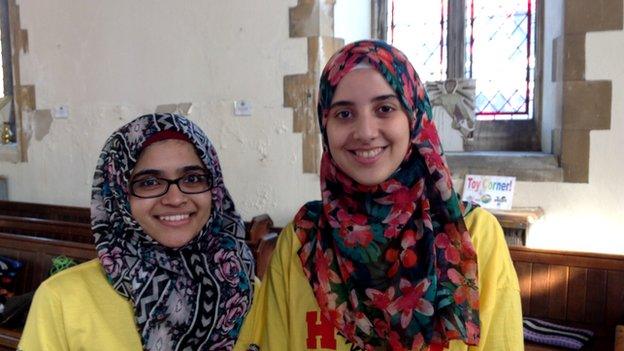
Fadhila and Mariam have personal reasons for getting involved
Voter registration drives like this are usually thought to benefit the Labour Party, which draws more support from under-represented groups, but there is little evidence of this in Cathays.
"My family's in the Labour Party but I don't think they are in the right place at the moment," says 21-year-old drama student Luke MacGregor.
"I don't think Miliband is the strongest leader or he hasn't proved himself yet to be the strongest leader and hopefully in these live television debates he can do that."
His friend, Tim Preston, who also signed up to join the register agrees: "For me personally, there is not one at the moment that is going, yeah that's the one I'm going to vote for, which is why I think a lot of people aren't voting."
If anything, while I was there anyway, it was the Green Party that seemed to have captured the imagination of the idealistic, left-leaning young people attracted to the NoVoteNoVoice bus. They have no time for the Lib Dems, regarding the party's U-turn over tuition fees as a betrayal.
For some of the volunteers there is a personal reason for wanting to get involved.
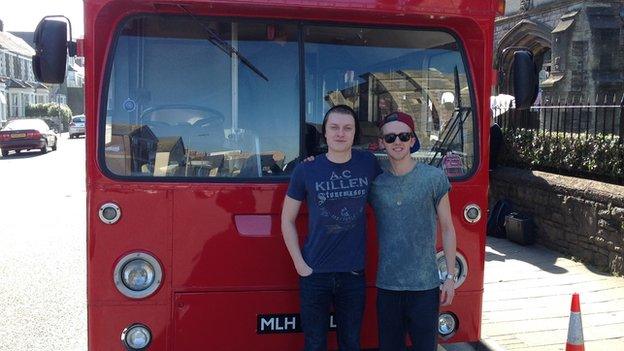
Luke and Tim were unsure about which way to vote
Mariam Afifi, a 21-year-old British citizen whose family is from Egypt, says she knows people "who have been imprisoned for protesting peacefully, trying to have their voice heard".
"For me personally I just think it's a shame that we have that right and people are just not willing to use it, when other people around the world are actually dying to have that."
Mariam's friend Fadhila, who is studying in Cardiff, is not entitled to vote on 7 May but says she and some of her fellow international students were inspired to take part to give others a voice.
"The whole experience is really new to me because we are from Monarchial countries, we don't have voting systems, and we don't have a right to speak, or a right to choose who to make our laws."
She adds: "We always say that if you speak about politics you will go behind the sun. That means nobody will know what will happen to you. It's an Arabic phrase."
'Cold calculation'
For others, the drive is a chance to make sure their community's voice is heard.
Faisal Ali, 23, a student from Cardiff's Somali community, says there is a basic lack of understanding about how the voting system worked among first generation Somali asylum seekers and what the different parties represent. There is also a language barrier.
Mr Ali has done a stint as an intern for a Labour Welsh Assembly member. "I'm as political as it gets, basically," he tells me, before adding that he too is thinking of voting Green.
He has a sharp awareness of where young people come on the Westminster priority list and why they need to get organised.
"Politicians don't respond to us because we don't take part so they think there is no point in bothering themselves winning the votes of students, who probably wouldn't vote anyway.
"It's a cold calculation by politicians really."
The Cathays volunteers managed to sign up more than 100 potential new voters in a couple of hours, before returning to a local church for a "vegan feast" and lemonade.
Not a bad haul, and they didn't even need to get the sweets out.

How to make sure you can vote
The deadline for registering vote in the general election is Monday, 20 April.
You can register once you are 16 although you will only be able to vote on 7 May if you are 18 or over on the day.
If you are a citizen of another EU member state or Commonwealth country living in the UK, and unsure whether you are entitled to vote in the general election or local elections check the Electoral Commission website., external
You can register to vote online through the government's gov.uk portal, external. The process takes five minutes and you will need your national insurance number.
If you are unsure whether you are already registered or want to update your details, contact your local electoral registration officer to find out. You can also register to vote by post.

- Published5 February 2015
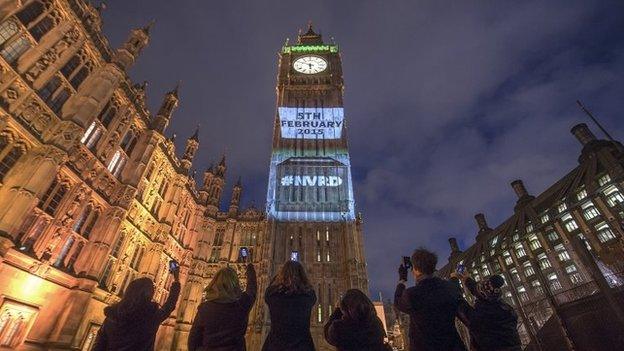
- Published7 December 2014
